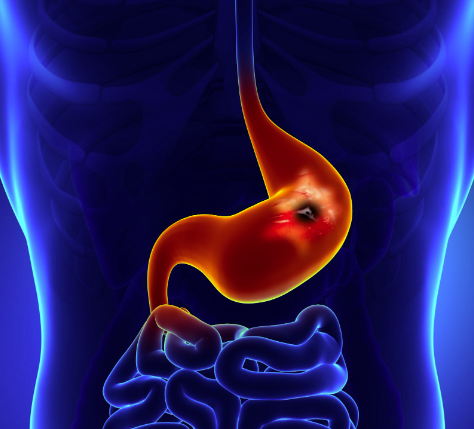Peptic ulcer disease (PUD), a common gastrointestinal disorder, involves open sores or lesions in the lining of the stomach or the upper part of the small intestine (duodenum). The root causes include infection with Helicobacter pylori (H. pylori), chronic use of NSAIDs (nonsteroidal anti-inflammatory drugs), stress, smoking, and poor dietary habits. While medical treatment—often involving proton pump inhibitors (PPIs), antibiotics, and antacids—is essential for managing acute ulcers, diet plays a pivotal role in both healing and long-term management. In fact, as modern science and Ayurveda agree, diet can indeed be medicine.
The Modern Medical Perspective: Healing Through Nutrition
Modern medicine recognizes that certain foods can exacerbate or soothe ulcer symptoms. The goal is to:
- Reduce gastric acid secretion
- Protect the mucosal lining
- Prevent recurrence
Foods to Include:
- Probiotic-rich foods: Yogurt, kefir, miso, and sauerkraut help rebalance gut flora, especially beneficial after H. pylori eradication therapy.
- Fiber-rich foods: Oats, bananas, apples, and legumes slow digestion and reduce excess acid production.
- Vitamin A enriched vegetables: Carrots, sweet potatoes, and spinach help regenerate mucosal tissue.
- Lean proteins: Paneer, eggs, dals, and soft-cooked legumes are gentle on the stomach.
- Healthy fats: Ghee and cold-pressed oils help soothe the lining and offer anti-inflammatory benefits.
Foods to Avoid:
- Spicy and fried foods: These irritate the stomach lining.
- Caffeine and carbonated drinks: Increase acid production.
- Citrus fruits and vinegar: Can trigger pain in sensitive individuals.
- Alcohol and smoking: Directly damage the mucosal lining and delay healing.
The Ayurvedic Insight: Agni and Ahara
Ayurveda views ulcers as a result of impaired digestion or “Mandagni” (weak digestive fire), often influenced by excessive Pitta dosha. Ayurvedic management focuses on pacifying Pitta and strengthening Agni.
Dietary Guidelines (Pathya Ahara):
- Warm, soft, and mildly spiced foods: Moong dal khichdi, cooked rice with ghee, and steamed vegetables are staples.
- Milk: Raw cow’s milk (boiled and cooled) is considered healing and soothing.
- Herbal support: Licorice (Yashtimadhu), Shatavari, and Amla are known to protect the gastric lining and improve healing.
- Coconut water and pomegranate juice: Help balance Pitta and aid digestion.
Foods to Avoid (Apathya Ahara):
- Excessively sour, salty, and spicy foods: Aggravate Pitta and delay healing.
- Fermented foods and heavy dairy: Can create Ama (toxins) if digestion is weak.
- Skipping meals or fasting excessively: Weakens Agni further and worsens symptoms.
Bridging Modern and Ayurvedic Approaches
Combining both systems can offer a holistic and sustainable healing pathway:
- Start your day with warm water and soaked almonds (to kindle Agni gently)
- Mid-morning snack: Stewed apple or banana to soothe the lining
- Main meals: Include rice, moong dal, steamed vegetables, and ghee
- Spices: Use fennel, coriander, cumin, and turmeric sparingly for their anti-inflammatory and digestive properties
- Avoid cold, raw, and processed foods
Let Food Be Thy Medicine
Peptic ulcer disease requires a multifaceted approach, but food is undoubtedly a powerful healer. By embracing a balanced, soothing, and nutrient-rich diet grounded in both modern nutrition and Ayurvedic wisdom, one can reduce symptoms, promote healing, and prevent recurrence. Always consult your healthcare provider or a qualified Ayurvedic practitioner before making significant dietary changes, especially during active ulcer phases.
References:
- Malfertheiner, P., et al. (2017). Management of Helicobacter pylori infection—the Maastricht V/Florence Consensus Report. Gut, 66(1), 6-30.
- National Center for Complementary and Integrative Health. (2021). Licorice Root.
- Lad, Vasant. (2002). The Complete Book of Ayurvedic Home Remedies. Harmony.
- Harvard Health Publishing. (2020). Foods That Fight Inflammation.
- Agnivesha, Charaka Samhita (Ayurvedic classical text), Chikitsa Sthana.

Akanksha Sharma
Dr. Akanksha Sharma, Head Writer and creator of AtoZ of Pregnancy, is dedicated to empowering women, parents, and families through 360-degree knowledge. She and her team provide evidence-based advice to guide families through pregnancy, parenting and beyond.






